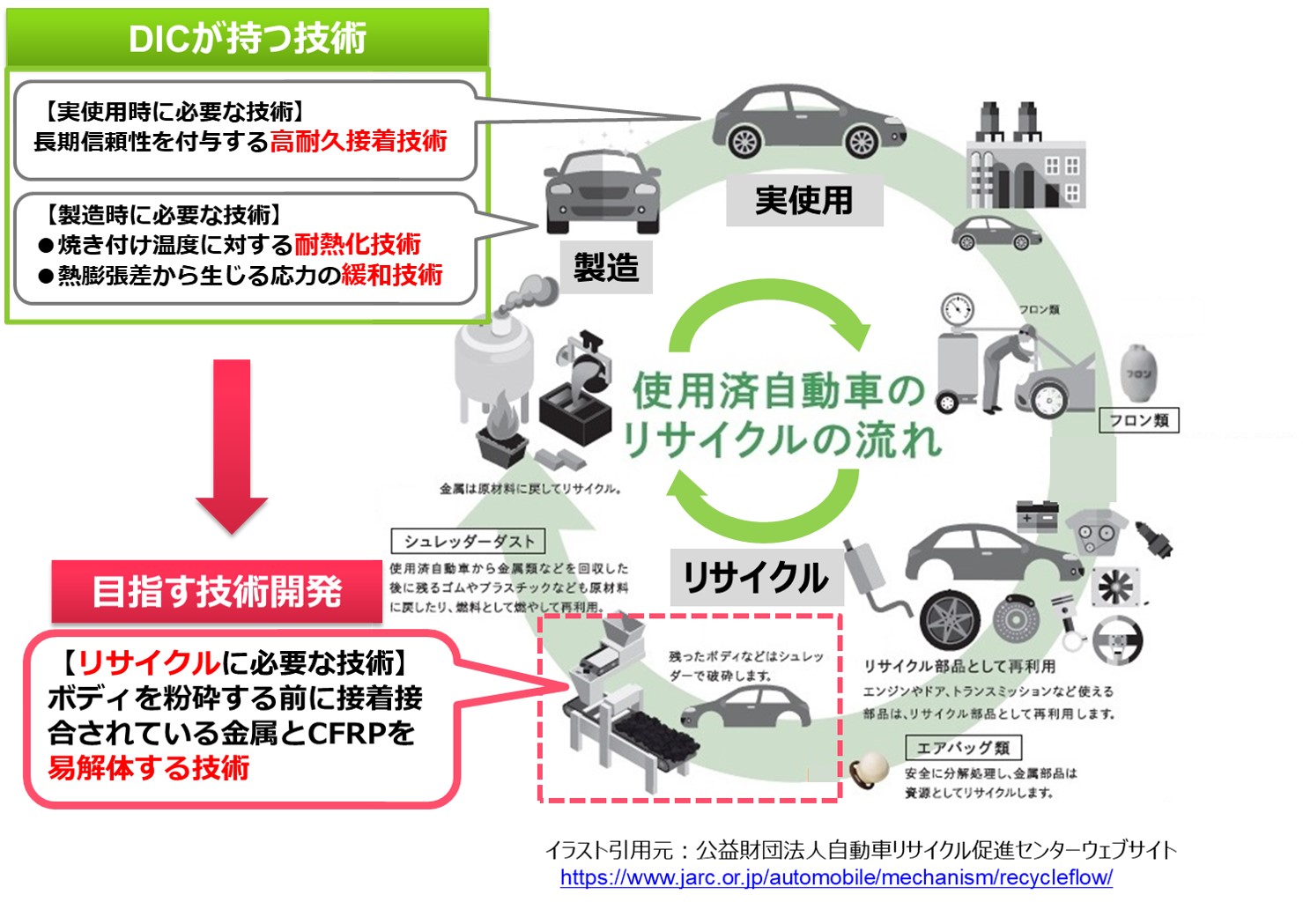DIC Announces Plans to Participate in a Collaborative Project Involving Industry, Government and Academia to Develop Innovative Adhesion Technologies that Contribute to the Achievement of Japan’s Vision for Society 5.0
—New adhesives will help facilitate the recycling of electric vehicle components
and the realization of a cyclical economy—
- Sustainability
- News Release
Tokyo, Japan—DIC Corporation announced today that beginning in the current fiscal year, it will participate in the Japan Science and Technology Agency (JST)-Mirai Program’s “Development of innovative adhesion technologies for realizing Society 5.0”* research project, also called the Creating Reiwa Era by Adhesion (CREA) project. This project promotes R&D in innovative adhesion technologies that help reduce the weight of next-generation electric vehicles and autonomous vehicles—key to next-generation mobility—and facilitate the recycling of components used therein. DIC will promote integrated technological development with other participating organizations and companies through open innovation with the aim of advancing to the verification testing phase by 2022.
CREA was proposed by a group of researchers, including Professor Keiji Tanaka of Kyushu University’s Department of Applied Chemistry, and is one of several major project-type technical themes selected by the Ministry of Education, Culture, Sports, Science and Technology for the fiscal year 2018 edition of the JST-Mirai Program. The project involves a consortium of researchers specializing in polymer chemistry, advanced measurement and mathematical sciences, who, with the support of designated major research organizations, conduct integrated R&D focused on phenomena occurring at adhesion interfaces.
Innovative adhesion technologies, the theme of this project, have been positioned as fundamental basic technologies critical to realizing the transformation of the automobile industry encapsulated in CASE,”† a pivotal concept in the Society 5.0 vision. In the field of mobility (vehicles), which plays a vital role in everyday life, manufacturers demand that new adhesion technologies guarantee strength and durability, thereby ensuring sound performance and reliability. Joint research efforts will include developing technologies for the bonding of different types of materials, which is crucial for structural adhesion, that will facilitate the development of epoxy resin–based adhesives that combine outstanding heat resistance, durability and separation, making vehicles easier to dismantle when scrapped and thus more conducive to recycling.
The DIC Group will continue working to contribute to the creation of a cyclical economy and the realization of the Society 5.0 vision by promoting the development of high-performance, highly recyclable composite materials that help revolutionize mobility.
* Society 5.0 is envisioned as a human-centered society that balances economic advancement with the resolution of social issues by achieving a high degree of convergence between cyberspace (virtual space) and physical space (real space). Society 5.0, which follows the information society (Society 4.0), was proposed in Japan’s 5th Science and Technology Basic Plan as the future society to which the country should aspire.
† CASE is an acronym for “Connected, Autonomous, Shared and Electric,” and is used to describe the transformation of the automobile industry thanks to next-generation technologies and new services in these four areas.
Note: The Japan Automobile Recycling Promotion Center (JARC) has granted DIC permission to use the diagram describing the recycling flow for automobiles until December 31, 2022.
-Ends-
Japan Science and Technology Agency:
CREA Project (Published in Japanese only):
DIC Corporation
DIC Corporation is one of the world’s leading fine chemicals companies, with top shares of the global printing inks, organic pigments and polyphenylene sulfide (PPS) compounds markets. Established in 1908 as a manufacturer of printing inks, DIC has capitalized on its capabilities in organic pigments and synthetic resins to build a broad portfolio of products for diverse industries, including automobiles, electronics, food and housing. DIC is also the core of the DIC Group, a multinational organization with operations in more than 60 countries and territories worldwide.


